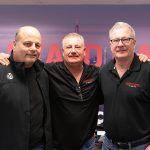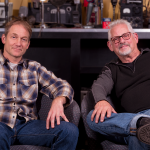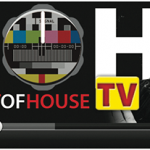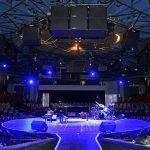
Mid South Audio (MSA) is a bit of a misnomer for the company that Kevin Short founded 29 years ago as the lone employee of a small recording studio in the Delaware area better known as the Mid Atlantic. That recording studio has morphed over the years, with an additional 10,000-square-foot facility currently under construction. The new building will house an inventory that now includes sound, lighting, video, staging, an expanded loading dock area and a front office space. They carry rigging and the Stageline series of staging and decking as well.
Short’s staff has grown to 12 full-time employees and a sizable group of freelancers who stay “as busy as they want to be” staging events and doing permanent installations.

Beginnings and History
During high school and college, Short’s main interests were as a musician and a hobbyist. Those two passions developed into a desire early on to build a recording studio. “I knew I had to probably get a real job, not that I ever had one,” Short says, laughing. “But I had always wanted to build a recording studio.”
Short worked as an intern at a local recording studio, which strengthened that desire even more, and in 1989, he began making that dream into reality. He supplemented his income and financed building the studio by doing equipment repair and a few small sound system installs. Based on his experience as an intern, he’d later develop an internship program at MSA. He mixes in his church when time affords, but “I don’t do as much as I’d like to, since my role has changed quite a bit over the years,” he notes.
“We were a company of one the first few years,” Short explains. “The sound system rentals then were just contract work for a couple of bands that I’d known for a long time. That kind of snowballed into more bands requesting systems,” says Short. At that point, he hired an employee, and the company formally began sometime around 1989.
Up through 1996, the main focus of the company was still the recording studio, supplemented by sound system rentals to clubs, small festivals and a few permanent installation clients. This led Short to hire a few more staff members, and eventually some tough decisions on how to sharpen the business focus. He opted to sell off the repair and service business in 1995. “While it served as a great way to meet people through the walk-in business, we just couldn’t find a way to make it self-sufficient and make a profit,” Short says. “You can spend an awful lot of time fixing a Princeton amplifier, but you really can’t get paid for the time you put into it.”

Steady Growth
As the audio production side of the business grew, Short strived to meet the demand. “It kind of snowballed from there,” he recalls. “We did a lot of work at the state fair and bluegrass festivals, where we got additional exposure to our work with bands in the clubs.” During the Bluegrass season, multiple festivals occur at the same time. In order to cover all his customers, Short wound up cross-renting too often.
From 1996 through 2005, this demand — coupled with customers increasingly seeking a one-stop shop solution — prompted Short to purchase three lighting companies, a sound company and a backline supplier. These were all either closing or going into receivership.
Since MSA’s inception in 1989, Short developed great friendships and relationships with his manufacturers. “Through their help, we were able to add to the inventories of those purchased companies with quality new gear as well,” he says.

A TEAM Effort
Seeking to further fulfill his customer’s needs, Short partnered with a staging and labor company called Tours, Entertainment, Amusement and Management (TEAM).
“We have become what our customers were asking for — a one-stop-shop that can handle all event needs, be it sound, light, video, staging or labor,” he says, “although we have stayed completely out of the security business.”
These relationships also helped MSA’s steadily growing permanent sound installations business take root. In 1996, Short realized he needed to develop a total integration service to better compete in the installation business. The company now is able to provide cutting edge lighting and video along with their sound installations into any facility their customers need.

The Yamaha Nexo Solution
In 2017, Short and MSA faced the same challenge they had experienced in the early 2000s — running out of gear due to broad demand as providers on shows. Cross rentals from other local vendors increasingly became more of a regular way of doing business. More to the point, it became an inconvenience to rely on fellow vendors that were experiencing high demand as well.
“We needed a new line array, and I wanted a relationship with a manufacturer and a product that equaled the experience I had with our first line array purchase from QSC 15 years ago. That by far was one of the best decisions I’ve ever made in my life,” says Short. Their line array had just come out, and as one of its early users, “we received stellar support every step of the way as we expanded our inventory.”
Short embarked on a year-long process that started with a short list of nine manufacturers and demos around the country, even going to France for the Nexo demo. He then
interviewed about 100 production managers he had worked with in the last five years, asking what they would choose if they could have any P.A. system they wanted. Short then cross-referenced this info with the riders that came across his desk. “This was going to be the largest single audio purchase in our company’s 29-year history,” Short says. The result of all that due diligence: Short chose a 98-box rig of Nexo STM.
From a rental perspective, Short says, the Nexo STM line array offers flexibility, sonic excellence, and increased output for its customers. “There’s a unique return on investment with a scalable and modular system like the STM,” he notes. “It’s simple to use, and like a Lego system, we can configure it the way we want, for example, breaking it into four systems for four separate gigs or corporate events.
“Of course, sound quality was a huge factor,” Short adds, “and although cost is always a consideration, there are different requirements for the various line array systems, but the financial difference between the two systems we were deciding upon didn’t play a big role.
“The customer service provided by Yamaha and our long relationship with them did, as well as the modularity of the new Nexo system,” Short continues. “We can deploy it for small or large festivals, and fairs and the corporate gigs in between. Not many rigs out there can work in those configurations. Nexo has been very responsive to our needs.”

A Simple and Solid Plan
Short credits his father, uncle and cousin as mentors in forming his business philosophy. They were, respectively, a business owner, a financial adviser and an accountant. He grew up watching his father run his own business, and the importance of customer service stood out most clearly to him. “That has been at the core of my business philosophy since we were a small recording studio and continues today,” he says. “This year, we’re on track to do over 500 gigs.”
Currently on the books are scheduled dates with Lee Brice, Trombone Shorty, The National Folk Festival, Jefferson Starship, Max Weinberg, Take 6, Cheap Trick and many corporate events. Upcoming installations, meanwhile, include seven performance spaces at the Maryland Renaissance festival in Crownsville, MD and many churches, theaters and schools.
“Every gig we do is the most important thing going on in that customer’s world at that time,” Short says. “It’s our responsibility to give them that level of attention, so they know they hired the right person to bring the solution to the table.”
As far as business model, Short cites the critical importance of repeat customers. “We want to know that we’re doing this show or this series of shows for our customer the next season, too. It helps us plan, manage people and inventory. In the end, it improves the product as well.”

The Future
The new 10,000-square-foot office space also features a demo room that will double as a learning center. “As part of our partnership with clients, we’ll provide in-depth training in layman’s terms for customers and regular training staff,” notes Short.
The demo room will also serve as the new home for their popular Facebook Live show, Tech Talk Live — a monthly Q&A show that always features a new product segment and many giveaways.
The 16-track-on-1” tape recording studio that started it all will more than double in size in the new facility currently under construction, from 1,600 to 3,800 square feet. It will feature a Yamaha PM2000 digital console with capabilities to record a gambit of multiple platforms, from hard drive to Pro Tools to Cubase.
But gear aside, the backbone of any successful business is its people. The first employee Short hired still works for them. “The joke around the office is we mate for life,” says Short. “We are staffed with dedicated people that love their jobs and consider themselves fortunate to have built their career here,” says Short. “We have been blessed with a minimal amount of turnover and a maximum amount of dedication.”
For more info, visit www.midsouthaudio.com.



